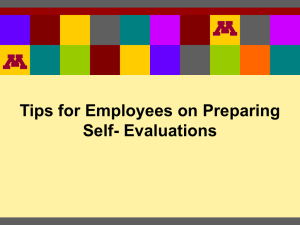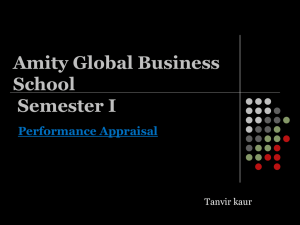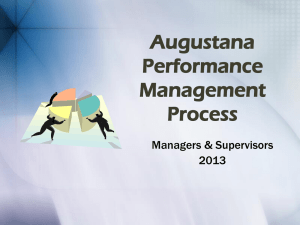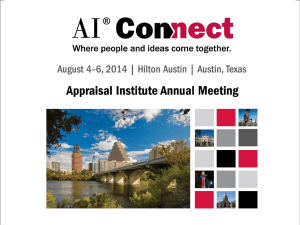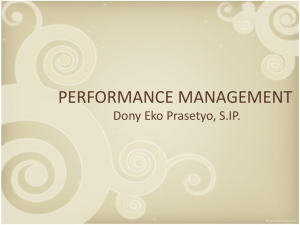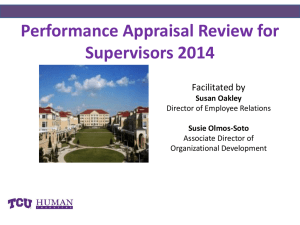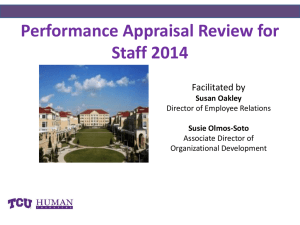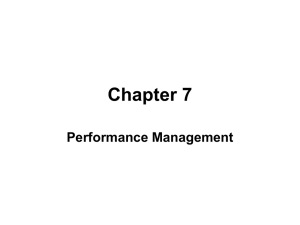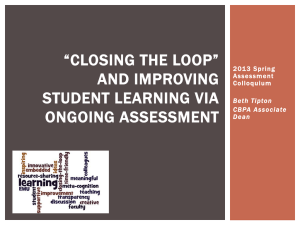PowerPoint file
advertisement
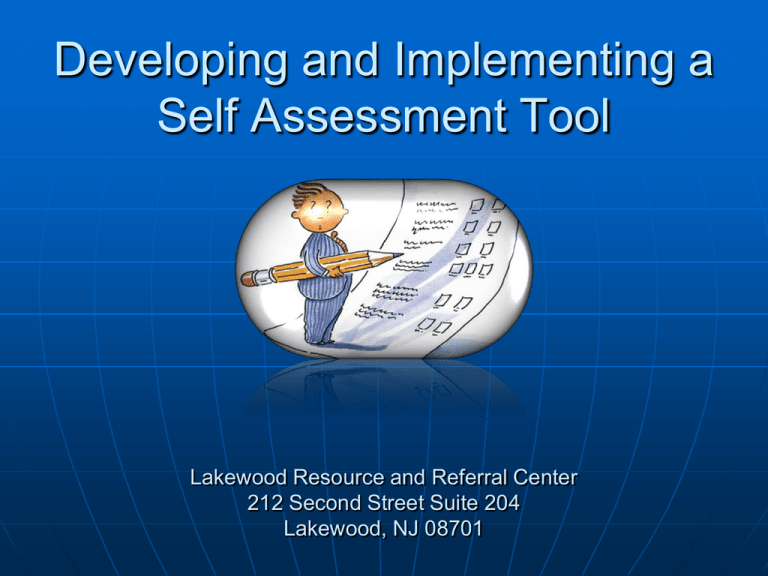
Abhijeet Talapatra 9301 Developing and Implementing a Self Assessment Tool Lakewood Resource and Referral Center 212 Second Street Suite 204 Lakewood, NJ 08701 The Topics We’ll be Covering Appraisal Systems. What is 360 ̊? Process of 360 ̊ Assessment. Advantages and Disadvantages. Leading Questions and Suggestions. Various Methods Used Assessment Systems Traditional Methods *Straight Ranking Method *Essay Appraisal Method *Paired Comparison Method *Critical Incident Method *Field Review *Checklist Method *Graphic Rating Scale *Forced Distribution Modern Methods *MBO. *360 ̊ Method. *Assessment Centers. *Behaviorally Anchored. Rating Scale. *Human Resource Accounting. Agency Assessment Agency Assessments are essential for the effective management and evaluation of the agency and it’s staff. Appraisals help develop individuals, improve organizational performance, and feed into business planning. Formal performance appraisals are generally conducted annually for the overall agency and all staff in the agency. Agency and Staff performance appraisals also establish individual training needs and enable organizational training needs analysis and planning. Agency Assessment Reviews the agency’s and each individual's performance against objectives and standards for the trading year, agreed at the previous appraisal meeting. Essential for career and succession planning. Provide a formal, recorded, regular review of performance, and a plan for future development. Important for staff motivation, attitude and behavior development, communicating and aligning individual and organizational aims, and fostering positive relationships between management and staff. What is 360 Degree Appraisal? 360-degree Appraisal is an assessment process used to improve an agency’s effectiveness by providing the senior level management with a more complete assessment of effectiveness, performance, and development needs. What the process involves Obtaining feedback from the senior level key contacts. These would normally include: o o o o o o The manager him/herself Subordinates (employees who work for the manager) Peers (fellow managers) Managers (senior management) Customers Suppliers The Process Superior Suppliers, Vendors Customers Peers Agency (Agency Assessment) Subordinates Team Members How to Implement 360 Degree? Planning Piloting Review Feedback 360 Degree Feedback Implementation How is Feedback obtained? By using a questionnaire which asks participants to rate the agency and individual according to observed trends & behaviors usually managerial or business-specific competencies. This process will not suit all companies. One should assess how well it would fit with the current culture before launching a scheme and a pilot scheme is worth building into the program. QUESTIONNAIRE DETAILS Part A : To be filled by the Respondent before the Interview and sent to Appraiser. A1 : Respondent to fill up his understanding of his duties and responsibilities. A2 :Discussion Points:• Has the past year been good/bad/satisfactory or otherwise for you, and why? • What do you consider to be your most important achievements of the past year ? QUESTIONNAIRE DETAILS • What do you like and dislike about working with this agency? • What elements of your relationship do you find most difficult? • What elements of your relationship interest you the most, and least? • What do you consider to be your most important tasks in the next year? • (What action could be taken to improve your performance in your current position by you, and your boss?) • (What kind of work or job would you like to be doing in one/two/five years time?) • (What sort of training/experience would benefit you in the next year?) QUESTIONNAIRE DETAILS A3 : The respondent has to list out the objectives he had set out to achieve in the past 12 months (or the period covered by this appraisal) with the measures or standards agreed - against each comment on achievement or otherwise, with reasons where appropriate. Score the performance against each objective (1-3 = poor, 4-6 = satisfactory, 7-9 = good, 10 = excellent) QUESTIONNAIRE DETAILS A4 : Respondent has to score his own capability or knowledge in the following areas in terms of your current role requirements (1-3 = poor, 4-6 = satisfactory, 7-9 = good, 10 = excellent). • commercial judgment • product/technical knowledge • time management • planning, budgeting and forecasting • reporting and administration QUESTIONNAIRE DETAILS • • • • • • • • • • communication skills delegation skills IT/equipment/machinery skills meeting expectations, deadlines and commitments creativity problem-solving and decision-making team-working and developing/helping others energy, determination and work-rate steadiness under pressure leadership and integrity QUESTIONNAIRE DETAILS Part B : To be filled by the Appraiser. B1 : Describe the nature of respondent’s relationship. B2 : Reviews discussion pts in A2. B3 : Reviews respondent’s objectives as given in A3. B4 : Scores the respondent’s knowledge or capability as given in A4. B5 : Discusses respondent’s relationship direction . B6 : Comments on competencies in current role and potential for next role or roles. What does 360 ̊ measure ? 360 degree measures behaviors and competencies. 360 degree addresses skills such as listening, planning, and goal-setting. 360 degree focuses on subjective areas such as teamwork, character, and leadership effectiveness. 360 degree provides feedback on how others perceive the Agency ADVANTAGES & DISADVANTAGES Advantages .. Method of collecting information from as many sources in employees’ and clients’ environment. Honest assessment as viewed by a variety of constituents. Confidential input from many people of how an agency fares in its mission and employee in his job. Helps the agency in seeing themselves as others see them. It provides information which neither senior level nor client may be aware of. Advantages Confidentiality an important aspect. Respondents find this method to be fair. Gives an indication of performance enhancing or distracting work situation. Allows to improve the system creating greater harmony and overall improvement. Help agency identify strength and address skill gaps. Lends to continuous learning , growing self confidence and improved productivity. Advantages to the Senior Level The system is helpful to the senior level as : • Accurate assessment. • Eliminate Routines. • Provides greater Objectivity. Why 360 degree Assessment Programs Fail? 360 performance rating system is not a validated or corroborated technique for Agency Assessment. With the increase in the number of raters from one to five (commonly), it become difficult to separate, calculate and eliminate personal biasness and differences. It is often time consuming and difficult to analyze the information gathered. The results can be manipulated by the respondents towards their desired ratings with the help of the raters. Why 360 degree Assessment Programs Fail? The 360 degree appraisal mechanism when used for employee appraisals can have an adverse effect on the motivation and the performance of the employees. 360 degree feedback – as a process requires commitment of top management and the HR, resources(time, financial resources etc), planned implementation and follow up. 360 degree feedback can be adversely affected by the customers perception of the organization and their incomplete knowledge about the process and the clarity of the process. Often, the process suffers because of the lack of knowledge on the part of the participants or the raters. Key Considerations Is your organization committed to continuous learning? Does your organization see the value of developing leaders in-house? Are you willing to make the changes necessary to do this? What is the level of trust in your organization? Will your culture support honest feedback? Is upper level management willing to lead the way and volunteer for 360-degree evaluation? Training Appraisers Train appraisers to eliminate rater error • • • • • Error of central tendency Leniency or strictness error Recent Response error Contrast error Similar to me error Effective appraisal programs . . . Comply with the law To ensure that the agency appraisal system does not violate principles of fair employment practices: - Job related performance standards - Provide employees with a written copy of the standards before the appraisal - Standards must be based on observable or measurable behavior - Train the raters - Provide feedback - Implement an appeal system to settle disagreements Conducting the Appraisal Interview •Ask for self assessment •Invite participation •Express appreciation •Minimize criticism •Change behaviour, not the person •Focus on solving problems •Be supportive •Establish goals •Follow up day-to-day The Guest is a better judge of the feast than the host Thank you. Q&A
